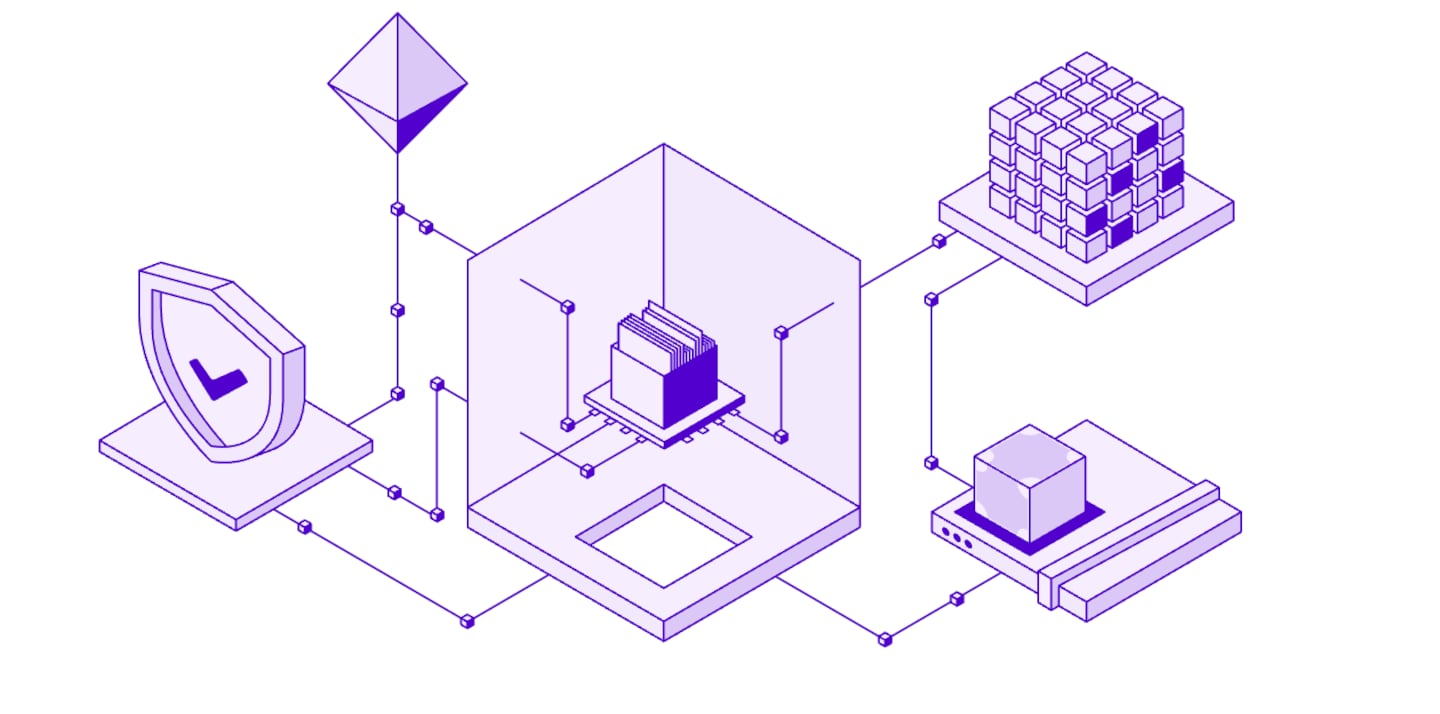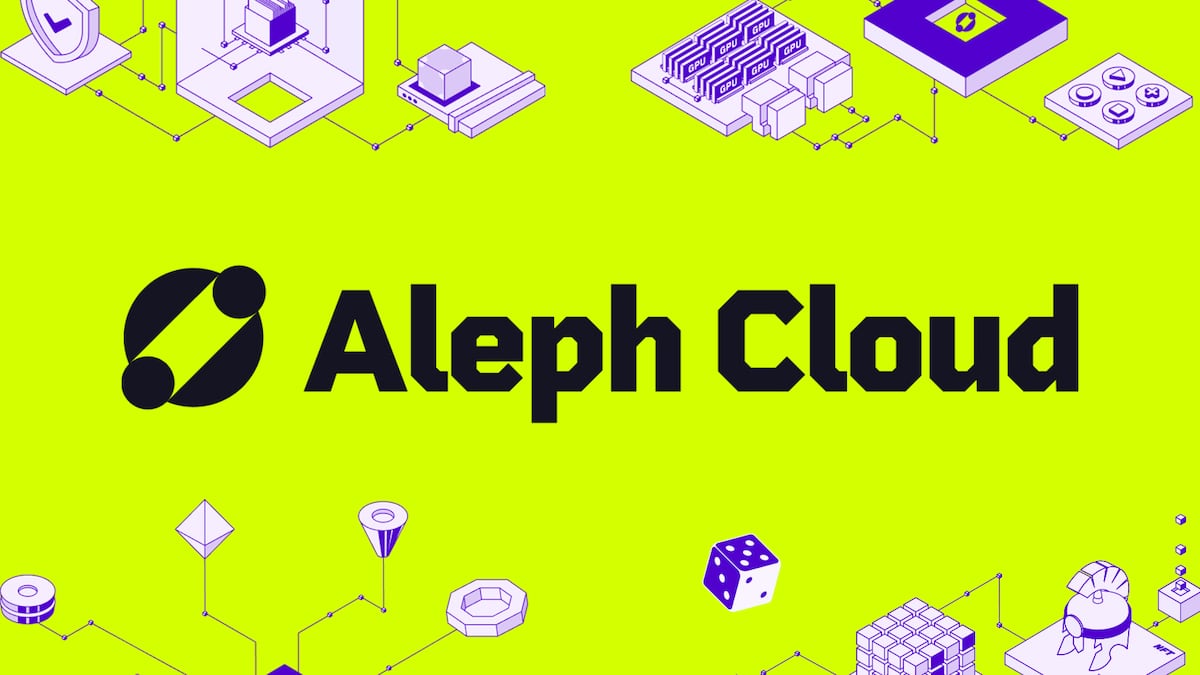Modern web3 and AI applications increasingly require infrastructure that goes beyond conventional cloud models.
Whether handling sensitive datasets, avoiding vendor lock‑in, or ensuring uptime during network disruptions, teams now prioritise infrastructure that is private, censorship-resistant, and chain-agnostic.
Aleph Cloud addresses this need by providing compute, storage, block indexing, and GPU acceleration over a decentralised network — one that is GDPR‑compliant and designed to give developers sovereignty over their backend infrastructure.
Aleph runs on a network of distributed storage and compute nodes designed to keep applications online and tamper-proof, no matter the conditions.
Developers can launch across multiple chains, pin data to IPFS automatically, and run sensitive workloads in encrypted environments, all while staying out of reach of centralised chokepoints.

Real-world use cases
Aleph Cloud is already powering infrastructure across AI, gaming, DeFi, identity, and fintech — each with unique demands around privacy, uptime, and data control.
From confidential inference pipelines to dynamic asset metadata, decentralised APIs, and verifiable credential flows, Aleph’s stack adapts to a broad spectrum of use cases.
One of the most notable AI implementations is LibertAI, which runs open-source LLMs on Aleph using IPFS for storage and Aleph Compute Resource Nodes for inference and model hosting. It also supports autonomous AI agents deployed via Aleph Cloud’s confidential VMs, enabling secure, decentralised execution environments for intelligent agents.
The project delivers decentralised and uncensorable AI while ensuring sensitive inputs remain encrypted via confidential compute environments like AMD SEV-SNP.
From there, a range of builders — from global gaming studios to onchain finance teams — have adopted Aleph to meet infrastructure needs that conventional cloud platforms can’t accommodate.
Gaming
Since late 2021, Ubisoft has operated one of Aleph’s Core Channel Nodes to store dynamic NFT metadata for games, including Champions Tactics and Captain Laserhawk.
By hosting mutable onchain assets off-chain via Aleph, Ubisoft ensured players could mint, evolve, and trade game items transparently, with decentralised hosting that avoids vendor lock-in or data silos.
Finance
Request Finance, a tool for invoicing in the DeFi and DAO space, uses Aleph to back up transaction and invoice data through both private and public IPFS networks.
Pairing Aleph’s decentralised storage and encrypted compute capabilities enables the platform to retain control and redundancy across infrastructure, without relying on centralised cloud services. Aleph’s support for cross-chain authentication and private IPFS backup strengthens the security posture of financial records.
With confidential compute environments isolating sensitive operations, Request Finance can maintain GDPR-aligned workflows without compromising on decentralisation or data integrity.
DeFi
DeFi protocol HyperSwap migrated its API and backend scripts to Aleph’s decentralised VMs, creating a fully distributed and censorship-resistant infrastructure that remains resilient against single points of failure, DDoS attacks, and centralised outages.
The team is also leveraging Aleph’s real-time indexing framework to expose liquidity, trade volume, and contract-level activity through decentralised APIs. This allows HyperSwap to power external dashboards, LP analytics, and multichain transparency tools without depending on centralised data providers.
With persistent storage and historical indexing, the protocol supports transparent, data-rich DeFi infrastructure across chains.
What builders actually use
Across these use cases, developers are relying on a consistent set of infrastructure components to power their applications.
One of the most widely used features is Aleph’s block storage and IPFS integration, which allows teams to store mutable or decentralised content while maintaining accessibility and redundancy across the network.
This is particularly useful for hosting dynamic NFT metadata or user-generated data that needs to remain verifiable but flexible.
For privacy-sensitive workloads, many projects turn to confidential virtual machines. These environments use hardware-backed encryption to ensure that code and data remain isolated, even from the machines executing them.
This has been critical for AI and fintech teams processing proprietary models, identity information, or financial records.
Aleph also provides onchain indexing capabilities, which developers use to serve data to frontends or third-party applications without relying on centralised APIs.
These indexing services, paired with decentralised data retrieval, are increasingly important for multichain apps that need reliable cross-network visibility.
Deployment-wise, teams often run services using containerised environments via Docker or Kubernetes, which Aleph supports natively. This makes it easier to port over existing workloads or scale up compute tasks dynamically as needed.
Finally, serverless APIs and stateless functions allow developers to trigger backend logic based on smart contract events or other inputs without maintaining a continuously running server.
This is especially useful for lightweight dApps and tools that only need to respond to specific onchain interactions.
As Aleph continues rolling out GPU access across its network, builders are also starting to experiment with GPU-accelerated workloads for rendering, AI inference, and real-time simulation.
These workloads are executed via community-contributed computing nodes, with early access currently in private beta.
New collaborations
In addition to LibertAI, Ubisoft, Request, and HyperSwap, Aleph has extended its ecosystem to include other early-stage projects and pilot integrations.
Aleph recently launched a $1 million web3 accelerator to fund teams building on its platform, with grants accessed via Soulbound tokens.
So far, it has issued over 200,000 non-transferable access tokens and onboarded teams across more than 26 blockchain networks.
A growing number of projects in areas like onchain insurance, healthcare data pipelines, and DeFi risk analytics are exploring Aleph’s decentralised infrastructure to manage sensitive or compliance-bound data.
With confidential virtual machines and redundant, censorship-resistant storage, Aleph is gaining traction among teams that require both privacy guarantees and high availability across jurisdictions.
As GPU rollouts accelerate, expect more AI-native collaborations to surface in 2025.
Builder support
Aleph Cloud is open to new developers through its builder portal. The platform provides free credits for new users, templates for common workloads like backend APIs, metadata hosting, and indexing, and full documentation on node architecture and confidential VM deployment.
For teams keen to explore real-world use cases, detailed case studies on LibertAI, Ubisoft, HyperSwap, Request, and Anima are available via their portal.
The builder program is supported by an active GitHub and Telegram community where contributors regularly share tools, troubleshoot deployments, and swap ideas on running infrastructure at scale.
It’s a hands-on environment that attracts a mix of solo tinkerers, DAO-aligned devs, and enterprise engineers working on everything from modular rollups to LLM agents.
With GPU support expanding and community-run nodes coming online, the Aleph ecosystem is just as much a growing network of co-builders as it is a platform for launching production-grade decentralised infrastructure.
Building beyond the cloud
By redefining how applications are built and scaled in a decentralised world, Aleph Cloud gives developers the tools to launch infrastructure on their own terms. There are no gatekeepers, no hidden costs, and no rigid architecture dictating how or where apps should run.
Whether you’re shipping a smart contract indexer, a GPU-powered AI agent, or a persistent game backend, Aleph provides a modular stack that grows with you.
Ready to build? Explore the docs, spin up your first workload, or join the builder community shaping Aleph from the ground up.


